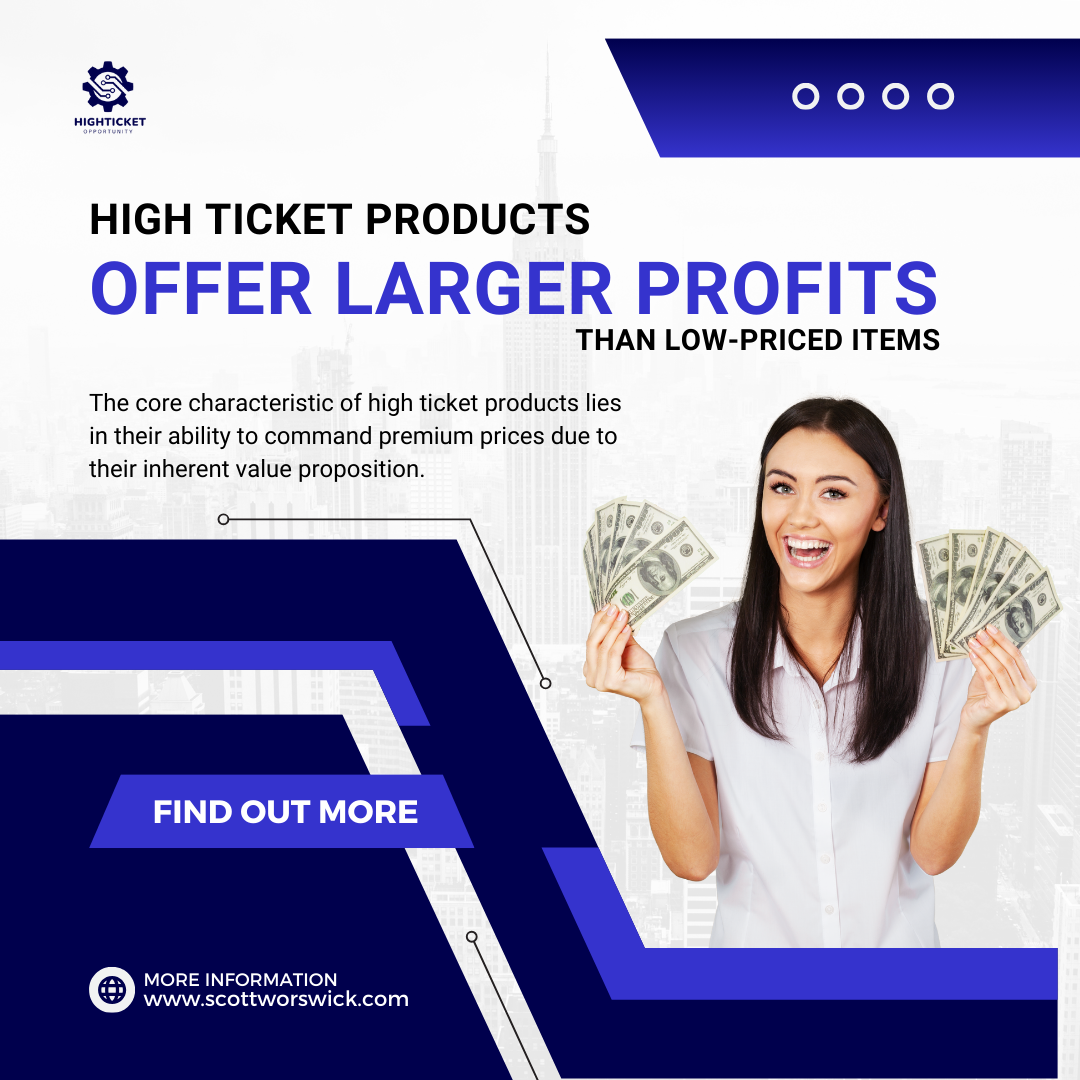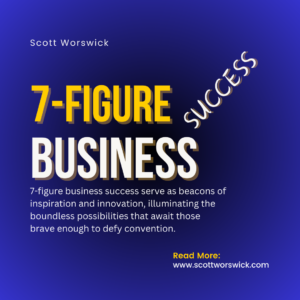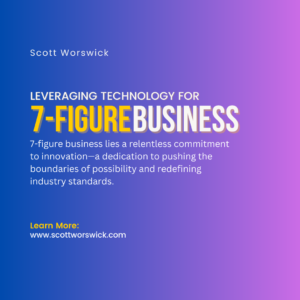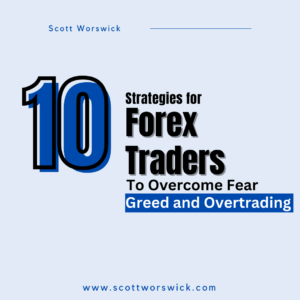In the dynamic landscape of online business opportunities, entrepreneurs are increasingly turning their attention to the realm of high ticket products. High ticket products, with their elevated price points, have emerged as a captivating avenue for those seeking larger profit margins compared to their lower-priced counterparts. This article delves into the compelling realm of high ticket products, exploring how their unique pricing structures offer entrepreneurs an unparalleled opportunity to amplify their financial success.
The allure of high ticket products lies in their inherent ability to command premium prices, paving the way for businesses to enjoy substantially larger profit margins. Unlike lower-priced items, which often necessitate higher sales volumes to achieve comparable revenue, high ticket products allow entrepreneurs to reap significant financial rewards with each transaction. This paradigm shift in pricing strategy not only transforms the financial dynamics of a business but also opens doors to strategic decision-making that can foster long-term sustainability and growth. Throughout this exploration, we will unravel the intricacies of high ticket products and unveil the manifold benefits they bring to the forefront of the entrepreneurial landscape.Navigating the landscape of high ticket products requires a nuanced understanding of market dynamics and consumer behavior. Entrepreneurs embracing this paradigm recognize that selling high ticket products is more than a transaction; it’s an immersive experience that hinges on conveying exceptional value. The perceived value of high ticket products often transcends their tangible attributes, creating a space where quality, exclusivity, and expertise converge. As we embark on this journey into the realm of high ticket products, we will unravel the art of crafting a value proposition that not only justifies the price tag but transforms each purchase into an investment, laying the foundation for sustained profitability and customer loyalty.
Table of Contents
1. Defining the Essence: What are High Ticket Products?
High ticket products, in essence, epitomize a shift in the paradigm of online commerce, ushering in a new era where the focus transcends transactional volumes to a niche-oriented, premium experience. Defining the essence of high ticket products involves understanding that they are not merely items with elevated price tags; rather, they represent a strategic choice to cater to a discerning audience seeking exclusivity and unparalleled value. In the world of online business opportunities, high ticket products carve a unique space where entrepreneurs curate offerings that resonate deeply with a specific demographic, creating a symbiotic relationship between product and consumer.
The core characteristic of high ticket products lies in their ability to command premium prices due to their inherent value proposition. These products are meticulously crafted to address specific needs or desires within a niche market, aligning with the unique preferences of a more discerning clientele. This deliberate focus on exclusivity allows entrepreneurs to not only provide a product but also curate an entire brand experience. As we delve into the essence of high ticket products, we uncover the intentional and strategic decisions that underpin their development, highlighting the careful balance between quality, rarity, and the desire for an extraordinary consumer journey.
For businesses venturing into the realm of high ticket products, understanding the essence goes beyond monetary transactions; it involves a commitment to delivering an exceptional product that transcends the traditional boundaries of value. High ticket products become an expression of craftsmanship, expertise, and a deep understanding of the target audience. By defining the essence of high ticket products, entrepreneurs can navigate the intricate landscape of premium offerings, aligning their business strategy with the aspirations and expectations of a clientele that values quality over quantity.
2. The Profit Margin Paradigm Shift:

The profit margin paradigm undergoes a significant shift when businesses delve into the realm of high ticket products. Unlike their lower-priced counterparts, high ticket products redefine the economic dynamics of an enterprise, allowing for a more favorable balance between revenue and expenses. This shift is marked by the understanding that high ticket products, with their elevated price points, enable businesses to enjoy larger profit margins on each transaction. This departure from the traditional sales model, where high volumes often compensate for lower prices, underscores the strategic advantage that high ticket products bring to the table.
In the high ticket product landscape, entrepreneurs find themselves in a position where each sale carries a more substantial financial impact. The increased profit margins associated with high ticket products not only provide a financial boon but also afford businesses the flexibility to reinvest in quality, marketing, and customer experience. This paradigm shift allows for a more sustainable business model, where the emphasis is on the quality of each transaction rather than sheer quantity. As we explore the profit margin dynamics of high ticket products, it becomes evident that this shift is not merely about the price tag but about redefining success metrics in the world of online commerce.
The transition to high ticket products also marks a departure from the traditional challenges of managing high transaction volumes. With each sale carrying a higher value, businesses can streamline their operations and focus on delivering an unparalleled customer experience. The shift in the profit margin paradigm empowers entrepreneurs to concentrate on building relationships, providing exceptional service, and refining their product offerings. As we delve into the intricacies of this transformative shift, it becomes clear that high ticket products not only elevate financial success but also pave the way for a more efficient and customer-centric business approach.
3. Quantifying the Difference: High Ticket vs. Low Ticket:
Quantifying the difference between high ticket products and their low ticket counterparts unveils a stark contrast in the economic landscape of online business. High ticket products, characterized by their premium pricing, represent a departure from the traditional low ticket items that rely on high transaction volumes. The sheer difference in transaction value underscores the economic advantage that high ticket products bring to businesses. By opting for a high ticket strategy, entrepreneurs can navigate away from the challenges associated with managing a large volume of low-value transactions, placing a strategic focus on the quality and value of each sale.
In comparing high ticket and low ticket products, the metrics of success diverge, with high ticket products offering a more lucrative and sustainable revenue model. The financial impact of each high ticket sale is substantial, allowing businesses to thrive with fewer transactions while maintaining healthy profit margins. This quantifiable difference enables entrepreneurs to make strategic decisions that align with the overarching goal of sustainable growth and profitability. As businesses assess their product offerings, understanding the quantifiable distinction between high ticket and low ticket becomes a pivotal factor in shaping a resilient and prosperous enterprise.
The quantifiable difference also extends beyond the immediate revenue figures, influencing the overall operational efficiency of a business. High ticket products, with their higher profit margins, empower entrepreneurs to invest in quality, marketing strategies, and customer experience. This investment-centric approach, compared to the quantity-centric approach of low ticket items, allows businesses to refine their offerings and cultivate a brand image synonymous with excellence. As we delve into the nuances of quantifying the difference, it becomes evident that high ticket products pave the way for a more strategic and sustainable business operation.
In essence, the quantifiable difference between high ticket and low ticket products reflects a paradigm shift in how businesses measure success. The emphasis on fewer trans. actions with higher value, inherent in the high ticket strategy, aligns with the evolving expectations of a market that values quality, exclusivity, and a premium experience. This shift challenges the conventional wisdom that success is solely determined by transaction volumes, urging entrepreneurs to recalibrate their metrics of prosperity in the ever-evolving landscape of online commerce.
4. The Economics of Value: High Ticket, High Reward:

The economics of value take center stage when delving into the realm of high ticket products, where the mantra is clear: high ticket, high reward. Unlike the traditional models centered around lower-priced items, the economics of high ticket products hinge on the delivery of exceptional value that justifies the elevated price point. Consumers engaging with high ticket products seek more than just a transaction; they seek an immersive experience, and the economics of value become a crucial aspect of the decision-making process for both buyers and sellers. In this landscape, businesses embrace the challenge of crafting offerings that not only meet but exceed the expectations of a discerning audience.
As businesses navigate the landscape of high ticket products, the economics of value become a guiding principle that shapes the entire customer journey. The value proposition extends beyond the tangible features of the product, encompassing elements such as exclusivity, craftsmanship, and unparalleled service. This holistic approach to value creation sets the stage for a high reward scenario, where customers not only pay for a product but invest in an experience that resonates with their aspirations and desires. Understanding the intricate interplay between the economics of value and high ticket products is paramount for entrepreneurs aiming to carve a niche in this distinctive market.
In the realm of high ticket products, the economics of value also redefine the concept of customer loyalty. As businesses prioritize delivering exceptional value, they cultivate a customer base that goes beyond one-time transactions. The high reward comes not just from the immediate profit margins but from the potential for long-term relationships, repeat business, and enthusiastic brand advocacy. This symbiotic relationship between high ticket products and the economics of value underscores the strategic advantage of prioritizing quality and customer satisfaction in the pursuit of sustained success in the competitive landscape of online commerce.
5. Reduced Transaction Volume, Amplified Profits:
Embracing high ticket products as a cornerstone of business strategy leads to a notable shift in the dynamics of transaction volume, ultimately amplifying profits. Unlike their low ticket counterparts that rely on higher transaction frequencies, high ticket products present businesses with the opportunity to achieve substantial financial success with a reduced transaction volume. This reduction in transaction frequency is a strategic advantage that allows entrepreneurs to streamline operations, allocate resources more efficiently, and focus on delivering an exceptional experience to a more select clientele. In essence, the emphasis shifts from managing a multitude of transactions to ensuring each high ticket sale is a meticulously curated and rewarding interaction.
The concept of reduced transaction volume in the realm of high ticket products aligns with the fundamental understanding that quality often trumps quantity. Businesses can channel their energy into perfecting the sales process, enhancing customer satisfaction, and fine-tuning their offerings without the strain of managing a high volume of transactions. This deliberate focus on quality over quantity not only results in a more efficient operation but also paves the way for sustained profitability. By recognizing the inherent value of high ticket products and their ability to amplify profits with reduced transaction volume, entrepreneurs position themselves for success in a competitive online marketplace.
The synergy between reduced transaction volume and amplified profits is particularly pronounced in the h.igh ticket product landscape. As businesses navigate away from the traditional model of chasing numerous low-value transactions, they embrace a more streamlined approach that places a premium on delivering excellence. This strategic shift not only enhances the bottom line but also positions the business for long-term success by fostering customer loyalty and brand advocacy. In the world of high ticket products, the mantra becomes clear: fewer transactions, greater impact, and amplified profits.
6. Navigating the Niche: Targeting the Right Market:

Navigating the niche market becomes a strategic imperative when venturing into the realm of high ticket products. Unlike the broad appeal of lower-priced items, high ticket products are crafted with a specific audience in mind. Targeting the right market is not just a consideration but a pivotal aspect of success in the high ticket product landscape. Entrepreneurs recognize that the inherent value of high ticket products is amplified when they resonate with the unique needs and aspirations of a discerning clientele. This targeted approach to market navigation ensures that the business aligns with the desires of a niche audience, creating a symbiotic relationship between the offerings and the consumers who seek exclusive and premium experiences.
The beauty of navigating the niche market with high ticket products lies in the focused marketing strategies it allows businesses to employ. Unlike mass-market approaches, businesses dealing in high ticket products can tailor their messaging, branding, and advertising to speak directly to the desires of their specific target audience. This personalized approach not only enhances the effectiveness of marketing efforts but also cultivates a sense of connection and authenticity. As businesses understand the importance of navigating the niche to successfully sell high ticket products, they position themselves as authorities in their field, building trust and loyalty within their chosen market segment.
For entrepreneurs, navigating the niche market with high ticket products is not just about finding a market; it’s about creating one. The deliberate decision to target a specific audience fosters a sense of exclusivity and belonging, with customers recognizing the unique value proposition that high ticket products bring to their lives. This approach transforms the business from a transactional entity to a curator of experiences, offering solutions tailored to the distinct needs of a discerning market. As businesses navigate the niche with high ticket products, they not only tap into the economic advantages of a targeted approach but also cultivate a brand identity that resonates deeply with their chosen demographic.
7. Quality Over Quantity: The High Ticket Slogan:
The ethos of “Quality Over Quantity” becomes the resounding slogan in the realm of high ticket products, marking a departure from the conventional wisdom of mass-market transactions. High ticket products epitomize a commitment to excellence, emphasizing that success is not measured solely by transaction volumes but by the inherent value and quality of each sale. This paradigm shift underscores the strategic advantage of prioritizing craftsmanship, premium materials, and meticulous attention to detail – elements that define the essence of high ticket products. The high ticket slogan encapsulates the idea that businesses, by focusing on delivering superior quality, not only distinguish themselves in the market but also cultivate a brand identity synonymous with luxury and exclusivity.
In the landscape of high ticket products, the high ticket slogan extends beyond the product itself to permeate every facet of the customer experience. From pre-purchase interactions to post-sale support, businesses prioritize delivering a seamless and exceptional journey for their clientele. This commitment to quality over quantity not only results in a higher level of customer satisfaction but also establishes the groundwork for long-term relationships and brand loyalty. As businesses embrace the high ticket slogan, they recognize that the true measure of success lies in the lasting impact and positive impression left on every customer, rather than the sheer volume of transactions.
The high ticket slogan challenges the conventional notion that success in business is solely derived from high transaction volumes. By making quality the focal point of the business model, entrepreneurs in the realm of high ticket products redefine success metrics. The deliberate choice to emphasize quality over quantity not only resonates with a market that values exclusivity but also positions the business for sustained growth and prosperity. In a world where the high ticket slogan reigns supreme, businesses understand that each sale is an opportunity to showcase their commitment to excellence and set themselves apart in a crowded marketplace.
8. The Trust Factor: Perceived Value and Customer Loyalty:
In the world of high ticket products, the trust factor plays a pivotal role in shaping the success of businesses. The perceived value associated with high ticket products is a key driver in establishing a foundation of trust with customers. Unlike lower-priced items, high ticket products carry a heightened sense of exclusivity and quality, instilling confidence in buyers that they are investing in something exceptional. This perceived value becomes the cornerstone of the trust factor, as customers believe that high ticket products offer a level of sophistication and satisfaction that transcends the ordinary.
Customer loyalty in the realm of high ticket products is intricately tied to the trust factor. When customers invest in high ticket items, they are not merely making a transaction; they are making a statement about their preferences and expectations. The trust factor is magnified by the commitment to delivering on the perceived value associated with high ticket products. Businesses that consistently meet or exceed these expectations build a loyal customer base that values the trustworthiness of the brand. As the trust factor becomes synonymous with the high ticket products, customers are more likely to return for additional purchases, fostering a cycle of loyalty that is a testament to the enduring power of perceived value.
The trust factor associated with high ticket products extends beyond the transactional phase to encompass the entire customer journey. From the initial engagement to post-purchase support, businesses in the high ticket market prioritize building and maintaining trust at every touchpoint. This holistic approach not only solidifies the perceived value of the products but also positions the brand as a reliable and reputable entity in the eyes of the consumer. As businesses understand the integral role of the trust factor in the high ticket market, they invest in strategies that foster transparency, communication, and a commitment to delivering on the promises inherent in their premium offerings. In the realm of high ticket products, the trust factor is not just a component of the customer experience; it’s the bedrock upon which enduring relationships and brand loyalty are built.
9. Entrepreneurial Flexibility: Scaling for Success:
Entrepreneurial flexibility takes center stage when businesses venture into the realm of high ticket products, offering a unique opportunity to scale for success. Unlike traditional models that might require a high volume of transactions to thrive, the high ticket approach allows entrepreneurs to adapt and scale strategically. The flexibility inherent in selling high ticket products empowers entrepreneurs to explore different market segments, refine their offerings, and pivot their strategies based on market trends. This adaptability becomes a key asset in the entrepreneurial toolkit, enabling businesses to navigate changing landscapes with agility and resilience.
The scalability of high ticket products lies in the ability to cater to a niche market without being constrained by the limitations of mass-market appeal. Entrepreneurs can fine-tune their business operations, marketing efforts, and product development to align with the specific needs and preferences of their target audience. This targeted approach not only enhances the efficiency of scaling efforts but also ensures that growth is sustainable and tailored to the unique demands of the high ticket market. As businesses leverage the entrepreneurial flexibility that comes with high ticket products, they position themselves to scale for success in a manner that is both strategic and responsive to market dynamics.
The entrepreneurial flexibility associated with high ticket products also extends to the adaptability in pricing and business strategies. Entrepreneurs have the freedom to experiment with different pricing structures, explore upselling opportunities, and tailor their offerings to evolving consumer preferences. This level of flexibility allows businesses to stay ahead of the competition and proactively adjust their approach to meet the demands of the market. In the dynamic landscape of online commerce, where trends and consumer behaviors evolve rapidly, the ability to scale for success with high ticket products provides entrepreneurs with a competitive edge and a pathway to sustainable growth.
10. Educational Marketing: Building Authority and Sales:
Educational marketing emerges as a powerful strategy in the realm of high ticket products, serving as a dual-purpose tool for building authority and driving sales. Selling high ticket products often requires a more nuanced approach that goes beyond conventional advertising. By incorporating educational content into the marketing strategy, businesses can position themselves as authorities in their niche. This educational aspect not only imparts valuable information to potential customers but also establishes trust and credibility. Through webinars, tutorials, and informative content, businesses can showcase their expertise, creating a connection with their audience that goes beyond the transactional nature of selling high ticket products.
The role of educational marketing in the high ticket product landscape becomes even more pronounced when considering the complex and sophisticated nature of these offerings. Customers investing in high ticket products often seek a deeper understanding of the value they are receiving. Educational marketing becomes a vehicle through which businesses can articulate the unique features, benefits, and applications of their high ticket products. By demystifying the intricacies of their offerings, businesses not only enhance the perceived value but also facilitate a more informed decision-making process for potential buyers. The educational approach becomes a strategic tool for bridging the gap between the business and the consumer in the high ticket market.
Beyond building authority, educational marketing serves as a catalyst for driving sales in the high ticket product space. Informed customers are more likely to make confident purchasing decisions, especially when it comes to high value and complex products. By providing educational content that addresses common questions, concerns, and showcases the real-world applications of their high ticket products, businesses can create a compelling narrative that resonates with their target audience. The educational component becomes an integral part of the sales process, guiding potential customers through the journey of understanding, appreciation, and, ultimately, conversion. In the high ticket product landscape, where trust and knowledge play pivotal roles, educational marketing becomes a strategic ally for businesses aiming to establish authority and drive sales.
Conclusion:
In conclusion, the world of online business opportunities is undergoing a profound transformation, and at the forefront of this evolution are high ticket products. The allure of high ticket products lies not only in their elevated price points but in the strategic advantages they offer to savvy entrepreneurs. This article has delved into the multifaceted benefits of high ticket products, highlighting their capacity to redefine profit margins, target niche markets, and foster enduring customer relationships. The mantra of “high ticket products” resonates as more than just a pricing strategy; it encapsulates a paradigm shift that prioritizes quality over quantity, leverages the economics of value, and unlocks entrepreneurial flexibility for those seeking to scale for success.
High ticket products, with their focus on excellence and exclusivity, represent a departure from traditional business models, challenging entrepreneurs to think strategically and elevate their offerings. The trust factor associated with high ticket products becomes a cornerstone in cultivating customer loyalty and brand advocacy. As businesses navigate the landscape of high ticket products, they not only amplify profits with reduced transaction volume but also tap into the transformative power of educational marketing to build authority and drive sales. In a marketplace where value, trust, and quality reign supreme, embracing the paradigm of “high ticket products” is not just a business strategy; it’s a commitment to carving a niche and thriving in the dynamic landscape of online commerce.





Pingback: The Future of Forex Trading: Trends and Innovations -